By Charlene Muhammad CHARLENEM
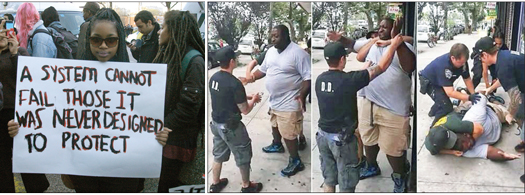
(FinalCall.com) – The U.S. was recently condemned by a United Nations body for human rights failures, particularly with regard to racism and police murders of Black men and boys. Activists, however, aren’t holding their breath waiting for the world super power to correct her wrongs.
America’s condemnation came via the Universal Periodic Review held every four years by the United Nations Human Rights Council. Each of the UN’s 193 member states are required to submit to a review of human rights obligations and commitments.
More than 100 international leaders raised concerns about U.S. human rights violations tied to police brutality, the death penalty, and the torture of Guantanamo Bay prisoners.
The council’s report included 348 recommendations dealing with human rights violations, according to an American Civil Liberties expert. The ACLU participated in the UN review process.
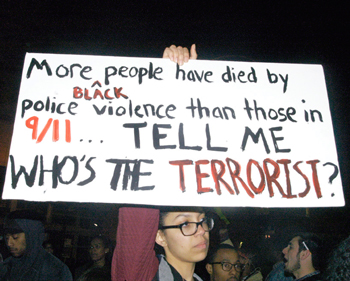
Jamil Dakwar, director of the ACLU Human Rights Program, said, “the report included many fitting recommendations to address police brutality and excessive use of force as well as ending racial profiling against minorities and immigrants.”
“Mexico recommended that the U.S. ‘adopt measures at the federal level to prevent and punish excessive use of force by law enforcement officials against members of ethnic and racial minorities, including unarmed persons, which disproportionately affect Afro American and undocumented migrants,’ ” he wrote on the ACLU website.
Ireland called for the U.S. to “continue to vigorously investigate recent cases of alleged police-led human rights abuses against African-Americans and seek to build improved relations and trust between U.S. law enforcement and all communities around the U.S.,” he added.
The UN report called on the Obama administration to independently investigate allegations of torture in the war on terror and provide reparations for victims with as “full rehabilitation as possible, including medical and psychological assistance.”
“Chad considers the United States of America to be a country of freedom, but recent events targeting Black sectors of society have tarnished its image,” said Awada Angui of the UN delegation to Chad.
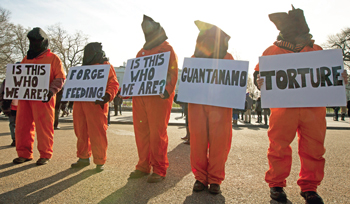
“This report sends a strong message of no-confidence in the U.S. human rights record. It clearly demonstrates that the United States has a long way to go to live up to its human rights obligations and commitments.
This will be the last major human rights review for the Obama administration, and it offers a critical opportunity to shape the president’s human rights legacy, especially in the areas of racial justice, national security, and immigrants’ rights,” said the ACLU official.
The Obama administration has until September to respond to the 348 recommendations, make a commitment to which of the 348 recommendations will be accepted and implemented over the next four years, and which will be rejected, he said.
Many recommendations are outside of the president’s power but the Obama administration should use all executive powers to protest human rights, said Mr. Dakwar.
“If President Obama really cares about his human rights legacy, he should direct his administration to adopt a plan of action with concrete benchmarks and effective implementation mechanisms that will ensure that the U.S. indeed learns from its shortcomings,” he said.
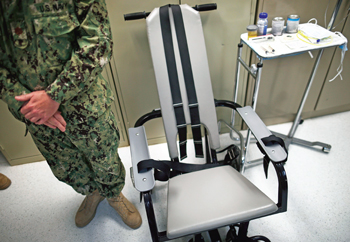
Instead of looking to the UN for solutions, activists are encouraged building on momentum gained in the aftermath of youth-led uprisings in Baltimore and State’s Attorney Marilyn Mosby’s decision to charge six officers in the death of Freddie Gray, an unarmed Black man who died a week after an encounter with police officers. He suffered a broken back and his spine was almost separated from his head.
“A really important thing is to remember that the only reason that these charges have come about on the officers in any of these cases is because the people have been rising up in tremendous ways that have really struck fear into the system,” said Aidge Patterson, coordinator for the New York-based People’s Justice for Community Control and Police Accountability, a coalition of grassroots organizations working in Black, Latino and Asian communities.
“It is at this time where we’re being asked to step back and to put our faith into the justice system, and that’s exactly what we cannot do. We have to continue to be out in the streets and really harder than we have been,” Mr. Patterson told The Final Call.
It would be an error to only allow courts to handle the problem because the justice system has proven to fail time after time, he said. Its response to brutal police murders is to allow cops to keep getting away with murder, he charged.
Expanded anti-racism training and stronger laws needed
The U.S. should strengthen legislation and expand training to eliminate racism and excessive use of force by law enforcement, said UN member states.
Police abuses are growing across America, activists noted. Take the case of 12-year-old Tamir Rice, gunned down by an officer in Cleveland, they said. The boy was playing in a park with a toy gun. Police officers responding to a 911 call, which the initial caller cautioned was “probably a juvenile” brandishing a “probably fake” gun. The dispatcher reportedly did not relay that information to responding officers. Timothy Loehmann, a 26-year-old rookie, shot Tamir less than two seconds after the patrol car pulled into the park. Tamir died the next day.
False U.S. image uncovered
The killings of Trayvon Martin, Tanisha Anderson, Michael Brown, Eric Garner and others belie the U.S.’s attempt to portray herself as an angel of light and human rights champion, activists argued.
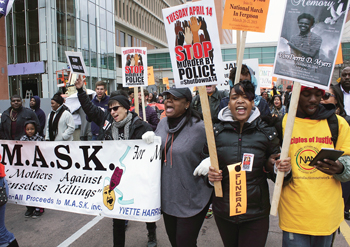
“As a nation founded on the human rights principles of equality under the law and respect for the dignity of the individual, the United States is firmly dedicated to the promotion of human rights,” the U.S. insisted in its report submitted to the UN body.
The U.S. continued, “Human rights are embedded in our Constitution, laws, and policies at every level, and governmental action is subject to review by an independent judiciary and debated by a free press and an engaged civil society. Not only do individuals within the United States have effective legal means to seek policy, administrative, and judicial remedies for human rights violations and abuses, the government itself pursues extensive and comprehensive enforcement actions to create systematic reform.”
Nothing could be further from the truth, charged Tef Poe, a young hip hop artist and rapper from St. Louis, which is near Ferguson, Mo., another flashpoint for police violence and protests.
“We’ve been fighting this since the 1800s. They kidnapped, abducted, raped, murdered. We’ve never been recognized in this nation as humans,” he said.
It’s time for not only the UN, but for other groups that Blacks have supported in their struggles, like immigration reform advocates, to push just as hard for Blacks as Blacks have for them, he added.
Many cases are coming to light because of cell phone cameras and the ability to film the police, which is garnering at least critique by the world community, Tef Poe said.
“That’s why in the midst of this, I do have some hope, how, we brand ourselves as a people who continue to find innovative ways to expose this and fight it,” Mr. Poe said. “The struggle and conflict against White supremacy is the same as the one Palestinians are fighting, the same battled during South African apartheid and people want the same recognition.”
Police officers must be punished for murdering people, people can’t take any more watered down solutions, Tef Poe said.
Limited UN power to check the United States
But, Tef Poe added, the United Nations is really powerless when it comes to upholding human rights where Blacks and even poor Whites are involved.
“The United States owns the United Nations,” he told The Final Call.
Last year he testified at the United Nations against the U.S. on police brutality, not just against Blacks, but people tortured and left for dead by police in cities like Chicago and St. Louis.
“The first thing that I observed is that America has a stronger grip on international politics than we as Black Americans realize,” he said. “The United States of America has managed to make the rest of the world put on a pair of glasses that apparently does not recognize Black Americans as a sovereign group of people. We’re not White people. We don’t have the same history. We don’t have the same lineage, and we don’t have the same treatment, and when is the time going to come for people to own that,” he said.
The U.S. has perpetuated anti-Blackness in international politics for years by pressing the UN to ignore irrefutable facts, documentation, statistics and testimony that prove racism and brutality against Blacks in the U.S., Tef Poe said.
International politics and international solidarity are part of the fight for justice–but not a magical solution, he added.
“I think we shouldn’t have any false visions about the powers that the UN has to keep the U.S. in check, especially when we see things like in Haiti where it’s the UN soldiers out there creating a lot of the oppression for the Haitian people,” added Mr. Patterson. “They don’t even hold tiny countries like Israel accountable for what they’re doing to Palestinians, so what can they do to a country like the U.S. and really is that even their vision?”
While many countries have real criticism of the U.S. and mean well, he doubts the world body itself and UN officials can do and would do much to enforce any “recommendations.”
“A lot of powerful people are in the position they are for very specific reasons and they don’t get in those places by showing a long history of actually caring about what’s best for people all across the planet,” Mr. Patterson said.
“It is correct to say that we have international support; but it is also correct to say that we’ve always had international support,” said Cynthia McKinney, a former U.S. congresswoman and presidential candidate.
In an email to The Final Call, she said, “What we haven’t always had, more acutely needed in the post-Civil Rights Movement era, is internal critical mass to propel our movement forward on the policy issues that count and to have that movement last for more than one generation.”
“The reason that we don’t have internal critical mass is because too many of us are too busy chasing after ‘White-approved leaders’ who have already been selected for us instead of doing the hard work and selecting and choosing leaders for ourselves. We have reached the acme of COINTELPRO’s goals for us rather than setting our own goals for ourselves,” Ms. McKinney said.
“That, in a nutshell is why our men, especially, are still being hounded and shot dead in the street. It’s another form of castration and indicates that we are still an enslaved people. If we could free our minds, we could certainly free our bodies.”
Justice or else
Efforts are gearing up for an October gathering convened by Nation of Islam Minister Louis Farrakhan in Washington, D.C., “Justice or Else, the 20th Anniversary of the Million Man March.”
“I think that’s beautiful and I think that’s very much what’s needed right now,” Mr. Patterson said. On one hand, he said, “Justice or Else” speaks to how long activists and the people have been in the streets, and how police violence and injustice against communities of color is not a new occurrence.
“They like to try to act like for some reason police are just starting to wild out now. No. It’s that people are actually being able to expose it now. It also speaks to how much without raising it to that level, how much this stuff is going to stay the same unless we raise it up to those levels and understand our history in this movement, as well as the history that this system has against us,” he said.
“I think that statement ‘Justice or Else’ really speaks to the only way we’re going to get justice, when they’re afraid that their power is going to be gone, when they’re afraid that it’s not going to just be about people voting out the next candidate or not just going to be about people being upset that justice isn’t there, but taking justice into their hands,” he said.
Tef Poe plans to join Minister Farrakhan in Washington, D.C.
“The Honorable Elijah Muhammad said something, which I believe, after you study these things, a lot of the doctrine that he was producing and a lot of the knowledge that he was putting out there, whether you agree with the lifestyle or not, he was right about a few things. And one of those components he was right about is the more we try to merge into this system, the more it’s going to reveal that it’s not capable of producing justifiable results,” Tef Poe said.
“It’s not about waiting for the justice system. It’s not about waiting for the UN. It’s not about waiting for the next governor or mayor or president that gets elected to make these changes. It’s about how are we going to make these changes ourselves?” added Mr. Patterson.












